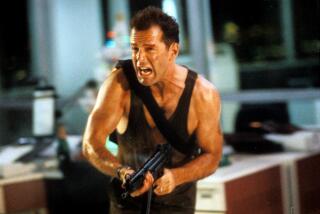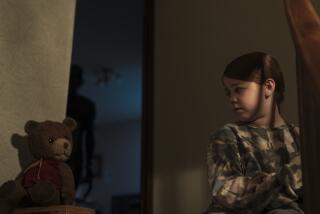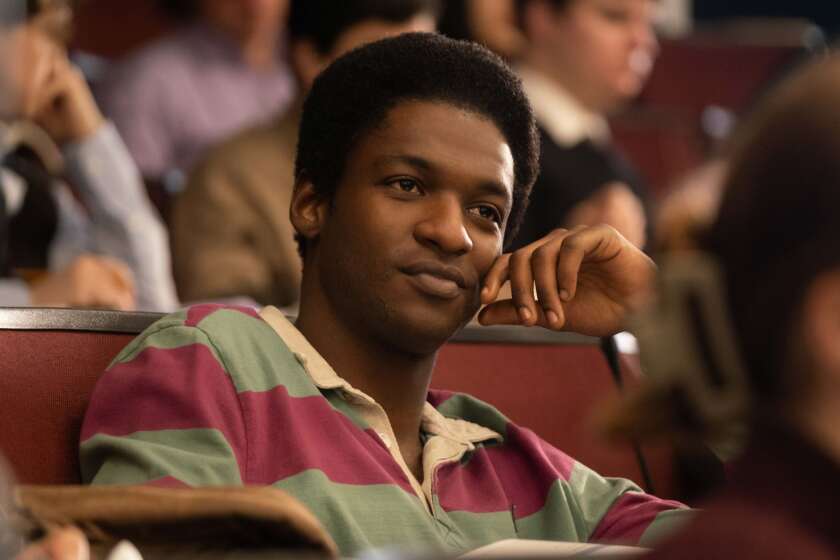MOVIE REVIEW : Witty Fun for Grown-Ups in ‘Look Who’s Talking’
Filmgoers fed up with the plethora of cute movie toddlers may want to steer clear of “Look Who’s Talking” (citywide), the opening minutes of which offer a special-effects look at the process of conception, taking precociousness to its most utter and horrifying extreme: Bruce Willis as a talking, smart-aleck sperm.
“Come on, guys! This way!” says Willis in voice-over, leading a brigade of tadpole-like swimmers toward the mecca that is the ovum of unexpectedly expectant mother Kirstie Alley, who has just been impregnated by a married man weaselly caricatured by George Segal. It’s a resolutely cute opener.
So is the rest of the movie but, rather surprisingly, given the gimmicky premise, it’s not gag-me-with-a-pacifier cute nearly as often as it is genuinely charming. Movies in which animals, babies or other voiceless beings speak their thoughts rarely work, but part of the strength of “Look Who’s Talking” is that Willis, as the sperm/fetus/baby, isn’t always talking. There’s enough fairly witty interplay between Alley, suitor John Travolta and the other grown-ups that the picture could conceivably work even without the baby talk.
Another unexpected strength is that it’s as much from the woman’s point of view as it is from the infant’s, thanks to writer-director Amy Heckerling, whose own mothering experiences account for much of the casual insight of the script. It doesn’t skimp on its unwed, 35-ish mother’s Angst : “You have no idea how hard it is to love someone so much who looks like someone you hate,” Alley tells her son, whose missing-in-action daddy has yet to meet him.
One mistake Heckerling does make is in painting her bright mother-to-be as such a sap when it comes to married men. A woman like Alley might stay indefinitely with a smarmy toad like Segal, sure, but to really, really believe all those excuses he makes for not leaving his wife? Not likely.
In any case, Alley has been predictably abandoned in favor of a less rotund mistress by the time she goes into contractions. At this point, she’s lucky enough to flag down New York’s foolhardiest taxi driver, Travolta, who also has enough of a sweet streak that he abandons his cab to assist in the delivery.
Travolta eventually ends up baby-sitting, and the kid is much quicker to identify him as a primo daddy candidate than his mom is. It’s been set up early on that Alley fantasizes her dates as prospective stepfathers, so once she and Travolta fall into bed, her amorous impulses are immediately stifled by an amusing fantasy of her future life as a blue-collar housefrau playing barefoot baby-maker to a portly, beer-popping Travolta.
Heckerling’s feminist tendencies don’t prevent from her writing her share of crass dialogue, like the “needle-removal” scene here, with Olympia Dukakis overhearing and misunderstanding an innocent exchange.
Yet by and large, after bottoming out with the John Hughes script of “European Vacation,” this is Heckerling’s chance to prove herself again as a director and for the first time as a writer; the sensitivity that informed the best moments of her first feature, “Fast Times at Ridgemont High,” is rampant here. And if the desire for fast comic timing causes her to skirt the more painful issues she has dredged up, at least there’s a sense of timing here, which is a lot to ask for these days.
Heckerling’s revival is also the ideal comeback for Travolta, who--after the annoying aerobics of “Staying Alive,” “Perfect” and “The Experts”--was badly in need of a role requiring little physicality and maximum gentleness. He’s every bit as charming and vulnerable as we’ve all forgotten he could be, and Alley, too, is little short of perfect in her most appealing part to date.
As for the baby’s-eye view of the affair, about half of Willis’ lines in “Look Who’s Talking” (MPAA-rated PG-13 for language and sexuality) are as cloying as you might expect, but the other half actually make a decently funny stab at approximating an infant’s single-minded mindset. Never mind that the animatronic doll that stands in for the fetus looks suspiciously like the Chucky of “Child’s Play.” At least they haven’t tried to make the baby a cynic; in fact, there’s very little that’s cynical about this surprisingly smart, sweet-tempered movie. W. C. Fields and his philosophical kin need not apply, of course.
More to Read
Only good movies
Get the Indie Focus newsletter, Mark Olsen's weekly guide to the world of cinema.
You may occasionally receive promotional content from the Los Angeles Times.










